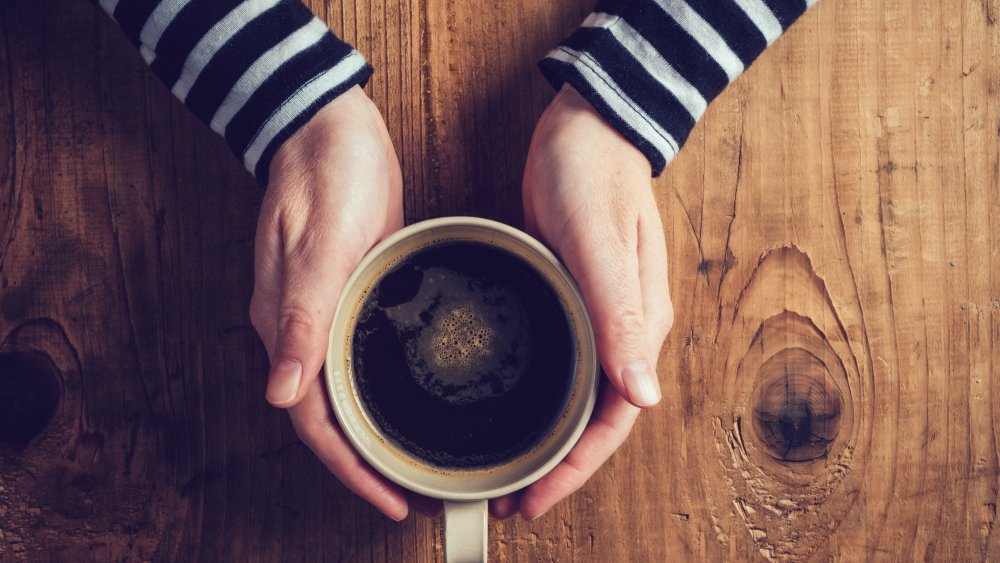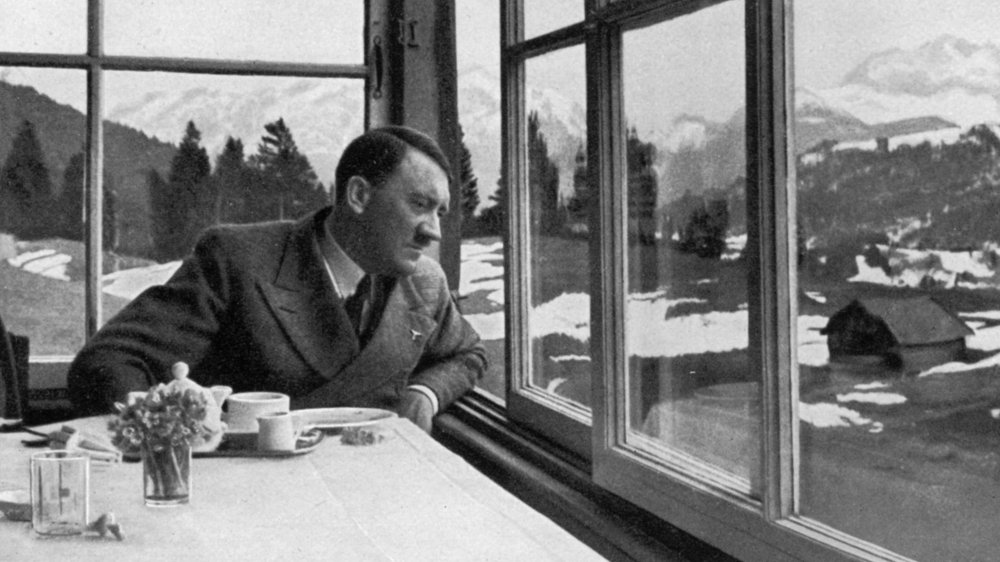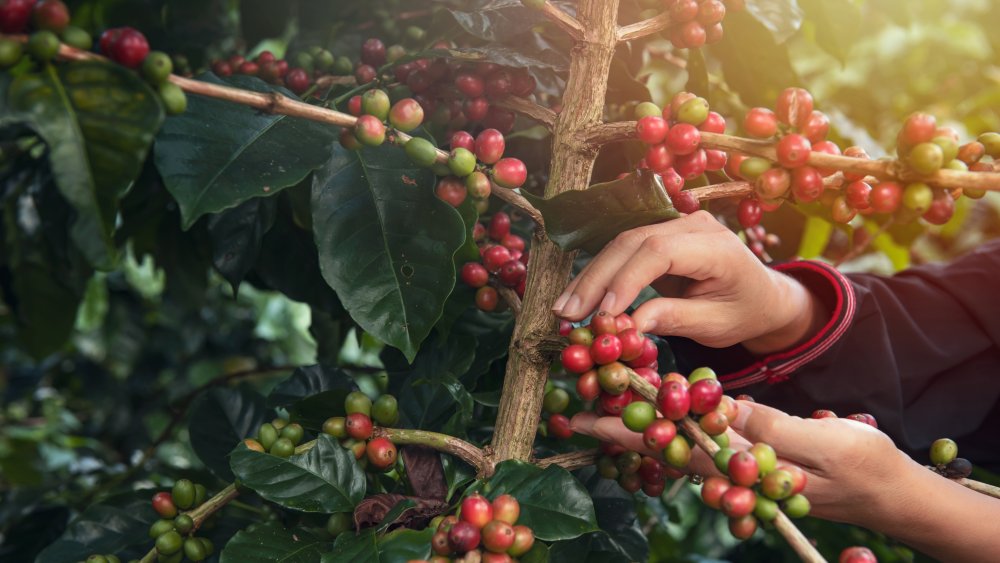The Untold Truth Of Decaf Coffee
Remember when a decaf coffee company opened a pop-up cafe in New York City? They were thoughtful enough to offer everything from espresso to cold brew (via The Washington Post). New Yorkers, who don't mince words, screamed that the event was the "first sign of the cultural apocalypse" (via Eater New York). Who, after all, wants coffee's bitter taste without the burst of energy that comes with it? (Yes, we know, decaf coffee isn't entirely caffeine-free. That doesn't make it your must-have morning pick-me-up, either.) But in the end, the pop-up cafe never stood a chance.
Decaf clearly isn't a hit in The Big Apple. It probably doesn't stand a chance in the Midwest, either. According to the National Coffee Association, Midwesterners are the least likely to order a cup of decaf. But other than that, decaf is doing alright. Sales of the drink are up, worldwide ( via The Guardian).
What's behind its success? Don't roll your eyes: millennials.
Why millennials are obsessed with decaf coffee
In the United States, millennials lead decaf consumption (via Perfect Daily Grind). Why? As on 29-year old decaf drinker explained, "Personally, I like moderation. Too much caffeine makes me drowsy and makes my eyes turn red. Decaf is ideal for a regular coffee lover like me. I take caffeinated once in a while, but decaf more regularly." Another decaf devotee said that regular was making her "super intense."
According to Stanford Health, millennials are the new "wellness generation." They are making better food choices and exercising more frequently than any generation before. You've doubtless seen the healthy living hashtags making it big on social media (#transformationtuesday, anyone?). It turns out that these trends encourage a herd mentality, where social media users follow Instagrammable food recommendations without doing their research (via Shape). Decaf coffee fits nicely with other "healthy" foods millennials have gone internet-crazy over, like avocado toast, seaweed, and oat milk.
The pros and cons of decaf coffee
But, wait, you might be thinking. Is decaffeinated coffee actually better for you than regular coffee? Maybe not. That all depends on your cholesterol. It's made with higher fat beans and, according to New Scientist, may negatively impact your cardiovascular system by increasing your blood's cholesterol levels. Robert Superko of the Piedmont-Mercer Center for Health and Learning in Atlanta, Georgia, explained, "I believe it's not caffeinated but decaffeinated coffee that might promote heart disease risk factors. The heart risk is not great — the fatty acids can be burned off easily by exercising. But someone with high-cholesterol, who drinks four or five cups of decaffeinated coffee a day, might want to think about cutting down."
Then again, decaf's low caffeine content may save you from the digestion problems and insomnia that a highly caffeinated cappuccino commonly provokes. And if that's reason enough to draw you to the drink, you're in good company. Decaf's entire existence hinged on marketing to people looking for healthier food choices.
Decaf coffee's surprisingly dark past
Before you ask, yes that's Adolf Hitler pondering the Alps and drinking what we think is a cup of coffee. No, we cannot confirm whether or not it was decaf. But we do know that decaf coffee became popular as part of a Nazi propaganda campaign (via Atlas Obscura). As the story goes, German merchant Ludwig Roselius invented decaf in the early 1900s, thinking that his father had died of too much caffeine (via Gildshire). Taking advantage of the Nazi's obsession with health and fitness, Roselius promised that his coffee would protect both the heart and the nerves.
Preoccupied with safeguarding the health of the Aryan race, Nazis soon made avoiding stimulants into official state policy. According to Atlas Obscura, the Nazi Party went so far as to proclaim that caffeine was poisonous to young people, "in every form and in every strength." Roselius' company, needless to say, took off.
Ironically, the process that Roselius patented in 1905 to decaffeinate coffee depended on the sweet-smelling chemical, benzene. Today benzene is known to cause cancer (via The Scientific American).
Can some decafs still give you cancer?
Not all decafs are made equal. To remove caffeine from coffee beans, you need to get green coffee beans wet enough to make the caffeine soluble. When the caffeine is soluble, it's ready to be extracted. The most cost-effective process to do so, the so-called direct solvent method, extracts the caffeine chemically. Don't worry, it doesn't use benzene. Instead, the direct solvent method uses ethyl acetate, or methylene chloride. Here's the catch. Like benzene, methylene chloride is a carcinogen. But, the FDA limits the amount that can be used.
It's worth noting that in the direct solvent method, chemical solvents are removed by steaming. You probably won't get cancer. But, if you'd rather not be drinking a decaf made using potentially carcinogenic or otherwise toxic chemicals, there are other options. Opt for coffee beans decaffeinated by way of pressurized carbon dioxide, or through Swiss water processing (via Coffee Confidential).
What if none of those decaf coffees taste right to you? Soon you might be able to sample decaf harvest straight from a decaffeinated coffee tree.
The secret existence of decaffeinated coffee trees
Naturally caffeine-free trees do grow in the wild in places like Cameroon and Madagascar (via The Guardian). It sounds good, we know. But there's a reason the world doesn't know about them.
For one, they're notoriously difficult to breed. Attempts to breed them famously failed in the 1980s and, again, the 1990s (via Decadent Decaf). Then, in 2004, scientists seemed to have made a breakthrough. Researchers proudly proclaimed that they'd discovered a way to crossbreed naturally caffeinated plants with decaffeinated plants, reducing their caffeine content by 70 percent. Coffee enthusiasts got their hopes up. Markets buzzed about the possibility of better-tasting, cheaper decaf (via Nature). Unfortunately, by 2008, it became apparent that as the much-talked-about cross-bred plants grew, they regained their caffeine content.
Don't give up. Research is, apparently, still ongoing. Until then? Maybe it's best to drink the age-old, caffeinated stuff.





